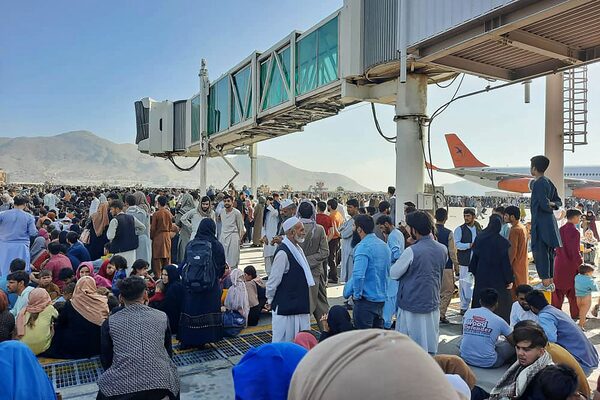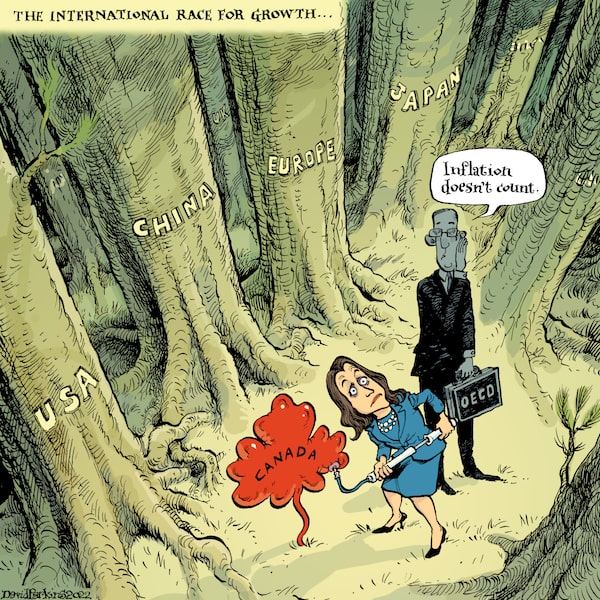Good morning,
An Afghan security guard who was twice wounded and decorated for protecting the Canadian embassy in Kabul has been stranded in Afghanistan since the Taliban takeover in August, his appeals for help from Canada left unanswered.
The Canadian government promised to evacuate the guard, whose name is Walid, from the country with his family. But they, along with many other Afghan support staff and military interpreters, were left behind when the last evacuation flights departed after the Taliban captured Kabul.
“I am disappointed that Canada has left us high and dry,” Walid, 46, said in a WhatsApp interview from a safe location in Afghanistan. “If you were the one who worked for 13 years for Canada day and night securing the safety of our foreign people, how would you feel?”

Afghans crowd at the tarmac of the Kabul airport on Aug. 16, 2021, to flee Afghanistan amid its fall to the Taliban.-/AFP/Getty Images
This is the daily Morning Update newsletter. If you’re reading this on the web, or it was forwarded to you from someone else, you can sign up for Morning Update and more than 20 other Globe newsletters on our newsletter signup page.
Canadian billionaire’s company fined by U.S. regulators for illegal donations steered to Trump campaign group
U.S. regulators have hit a Canadian steel magnate’s company with one of their largest election-related fines in history after he illegally helped orchestrate US$1.75-million in donations to a Donald Trump campaign group.
Barry Zekelman broke campaign finance law by helping direct the contributions from Wheatland Tube, a U.S.-based company he controls, to Super PAC America First Action in 2018, the Federal Election Commission (FEC) ruled, Adrian Morrow reports.
In an agreement between the FEC and Zekelman’s companies, Wheatland will pay a US$975,000 fine and ask America First to either return the donations or give them to the U.S. Treasury. Under U.S. law, it is illegal for foreign nationals to make campaign contributions or take part in decisions by American companies to donate.
For this Ukrainian couple in Lviv, getting married amid the war is an act of protest against Russia
As Oleksandr Sydielnikov stood outside a 17th-century cathedral waiting to get married on Sunday, his best man approached with news.
Andrii Chumak had just heard from Ukrainian Special Forces members who have been using two Jeep Wranglers that Sydielnikov helped to procure, writes Nathan VanderKlippe. The jeeps enabled the soldiers, who had come under fire by four Russian tanks, to escape through the swampy terrain.
Moments later, Sydielnikov walked up the steps into the cathedral with his bride, Svitlana Maistruk. In the eyes of the state, they were already husband and wife, after a civil ceremony last summer. But they had not yet exchanged church vows.
Russia’s invasion has brought to Ukraine a new sense of national unity. A wartime wedding represented an intimate expression of that sentiment.
More coverage:
- Ukraine repels attacks in east as Russian, Austrian leaders prepare to meet
- Ukrainians in Poland start cleanup drives as a way to say thank you for its support
- The last brave acts of the five Ukrainian men found dead and bound in a Bucha basement
- Canadians join global efforts to save Ukraine’s digital archives
- Trudeau says Russian forces are ‘systematically targeting civilians’ in Ukraine
- As Russia bombs Ukraine, a former Canadian diplomat to Moscow probes lessons of the 1972 Summit Series in new book
Got a news tip that you’d like us to look into? E-mail us at tips@globeandmail.com Need to share documents securely? Reach out via SecureDrop
ALSO ON OUR RADAR
Canadian watchdog asked to probe allegations that imports made with forced labour in China: A coalition of human-rights groups is asking Canadian Ombudsperson for Responsible Enterprise, a federal watchdog, to investigate allegations that some products sold by 14 Canadian companies are made in whole or in part with forced labour in China.
Most provinces’ stockpiles of ‘critical’ COVID-19 drug Paxlovid sitting unused: With the exception of Prince Edward Island, provinces and territories are leaving more than 90 per cent of their supply of Paxlovid, oral antiviral treatments for COVID-19, unused. Treatment must be started within five days of symptom onset, which is why experts say ease of access is key.
Macron, far-right rival face runoff in French election: President Emmanuel Macron and far-right leader Marine Le Pen will face off again on April 24 in a winner-takes-all runoff in the country’s presidential election, a repeat of the 2017 contest that made Macron France’s youngest-ever president. There is no guarantee this time, however, that he will beat Le Pen.
North Korea has become even more isolated during the pandemic: Since early 2020, the hermit kingdom of North Korea has been almost entirely cut off from the outside world. It’s even pausing most shipments from China, its major economic partner.
Listen to The Decibel: What scares Sarah Polley: The Canadian filmmaker and actor discusses the slippery nature of memories, how her relationship to her body has changed and what it’s been like to have the world read about vulnerable moments in her life.
MORNING MARKETS
The euro traded higher and the spread between French and German bond yields tightened on Monday after incumbent French President Emmanuel Macron won a larger than expected share in the first round of the French election. The pan-European STOXX 600 was lower by 0.7 per cent, but outperformance was seen in France’s CAC 40, which has risen 0.3 per cent. In early trading, Britain’s FTSE 100 in London fell 0.4 per cent and Germany’s DAX shed 0.7 per cent. The Nikkei 225 in Tokyo shed 0.6 per cent to 26,821.52 and Hong Kong’s Hang Seng retreated 3 per cent to 21,208.30.
WHAT EVERYONE’S TALKING ABOUT
France’s presidential election will make divisions worse, whether Emmanuel Macron wins or loses
“How much responsibility Mr. Macron bears for deepening cleavages within France is a matter for debate. His pedantic style has something to do with it. His obvious love of power and its trappings – which are particularly ostentatious, even for France – makes him a perfect foil for populists.” - Konrad Yakabuski
Disney CEO’s conflict with Florida Governor Ron DeSantis over ‘Don’t Say Gay’ bill shows growing fractures between business, GOP
“While Mr. DeSantis’s nose-thumbing continues to garner attention for him ahead of a potential White House run, the pressing question is whether the hay he makes with the party faithful will outweigh the damage he does by burning bridges – including those with big business – in the process.” - Gus Carlson
Why disasters – from wars to plagues – seem to happen all at once
“The tragic lesson of history is that it is well-nigh impossible to predict the next disaster. Those who try to do so are generally dismissed as Cassandras, not least because too many predict disasters that fail to materialize. In truth, the incidence of pandemics and wars is not predictable: They seem to be distributed randomly or with power-law distributions that make it impossible to attach ex-ante probabilities.” - Niall Ferguson
TODAY’S EDITORIAL CARTOON

David Parkins/The Globe and Mail
LIVING BETTER
Many of us have forgotten how to have fun. Here’s how to fix that
In early March, comedian and television writer Jan Caruana tweeted: “Have I forgotten how to have fun?”
For Caruana, like many others, the number of pandemic-approved activities quickly dwindled as COVID-19 restrictions took hold. Part of the problem, she says, is that after having nothing but time earlier in the pandemic, now she has too little.
Given current events, squeezing in some time for fun may seem like a low-priority pursuit, but there are mental, physical and emotional benefits.
MOMENT IN TIME: Ukrainians in Canada, 1975
In observance of the Ukrainian Easter, the Lord's Tomb is guarded at the Ukrainian Catholic Church of the Holy Protection on Leeds Street in Toronto, May 2, 1975. The tomb will be guarded until a sunrise service on May 4.James Lewcun/The Globe and Mail
For more than 100 years, photographers and photo editors working for The Globe and Mail have preserved an extraordinary collection of 20th-century news photography. Every Monday, The Globe will feature one of these images. This month, it’s Ukrainians in Canada.
Easter traditions for Ukrainians in Canada aren’t a whole lot different than in Ukraine, where it is considered an important holiday for families. There will be bread baking, egg decorating and church services, especially the blessing of Easter baskets. In the photo above, by The Globe’s James Lewcun from May of 1975, the Lord’s Tomb at the Ukrainian Catholic Church of the Holy Protection is guarded by volunteers. It’s a tradition that continues at that Toronto church, which was built almost 60 years ago. The tomb is erected on the evening of Holy Thursday (April 21 this year). On the Saturday afternoon, men and women from the Ukrainian Youth Association will guard the tomb. It is dismantled on the morning of Easter Sunday near the beginning of the sunrise service. This year, prayers will also be cast back to the home country, which is fighting against Russian invaders. Philip King
Subscribers and registered users of globeandmail.com can dig deeper into our News Photo Archive at tgam.ca/newsphotoarchive
Read today's horoscopes. Enjoy today's puzzles.
If you’d like to receive this newsletter by e-mail every weekday morning, go here to sign up. If you have any feedback, send us a note.